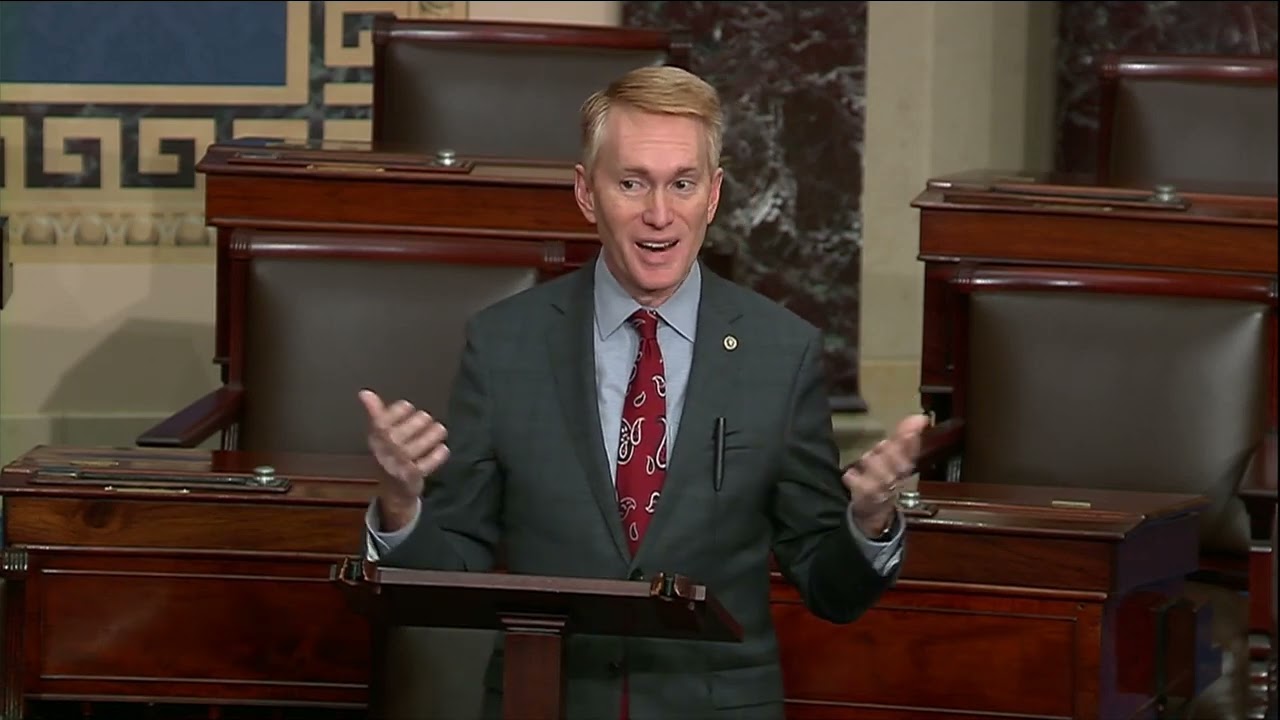WASHINGTON, DC – Senator James Lankford (R-OK) today took to the Senate floor to protect the conscience rights of all Americans by asking the Senate for unanimous consent to pass his Conscience Protection Act, which he introduced to protect healthcare providers, including health insurance plans from government discrimination if they decline to participate in abortions. Unfortunately, Democrats blocked Lankford’s bill to ensure all Americans have their conscience rights protected.
Lankford remains a staunch advocate for conscience protections, including for healthcare workers and insurance providers, who do not want to participate in abortions. He introduced an amendment that saved the long-standing Hyde and Weldon Amendments, which prohibit the use of taxpayer dollars to fund abortions and abortion-related discrimination against health care workers, including insurers.
Lankford called out the Biden Administration after a memo surfaced from HHS rescinding the authority of its Office for Civil Rights to investigate claims of violations of an individual’s rights under the Religious Freedom Restoration Act (RFRA). Lankford was joined by Senator Tim Scott (R-SC) and Representative Ralph Norman (R-SC) in sending a bicameral letter to Becerra, condemning HHS’s recent reversal of protections for faith-based adoption and foster care agencies.
Transcript
I guess I’m one of those extreme republicans that believe that a child that sucks their thumb, wiggles their toes and fingers, feels pain, has a beating heart, has a functioning nervous system, has DNA that’s different than the mom or the dad is a baby. I didn’t think that it was an extreme position to see a child as self-evident. That’s a child. I understand Americans are divided on whether children in the womb are convenient or inconvenient and if they’re inconvenient they can be thrown away as medical waste, but if they’re convenient they’re kept. I just think every child is precious, and I think every child should be honored and protected. So I guess that makes me extreme.
The bill that I bring today is a bill that just looks at the millions and millions and millions of Americans who believe like I do. Many of them work in hospitals, and they joined the health care profession and got a medical degree because they wanted to save life. They want to be a part of protecting individuals at their most critical times. But they also have this real belief, that’s a science-based belief, by the way, that a child in the womb is just like a child outside the womb and the only difference is time. Forty weeks ago you were 40 weeks younger. That child in the womb at conception and the child outside the womb is just 40 weeks older, just like you’re 40 weeks older than what you were 40 weeks ago. It’s still a child.
For the millions of Americans that believe like that, we’ve had conscience protection laws on the books for a long time. In fact, there are 25 conscience protection laws on the books in America right now. Many of these have not been controversial. In fact, if we go through the Church Amendments, when they were done, they protect the conscience rights of individuals and entities that object to performing or assisting in the performance of abortions or sterilizations against their religious beliefs or moral convictions. When that passed almost 50 years ago now, it passed 92-1 in this body. It just wasn’t that controversial. We understood that people disagreed on the issue of abortion. And why would you ever compel someone to be able to perform an abortion when their conscience objects to that?
In 2004, Congress created the Weldon Amendment. It’s on all of our annual appropriations bills. The Weldon Amendment bars the federal government and state and local government recipients of federal funds from discriminating against health care entities that refuse to provide, pay for, or provide coverage or refer for abortions. It’s not been that controversial. In fact, it was in the Consolidated Appropriations Act last year, which passed 92-6. This has not been that controversial to be able to honor the rights of individuals.
Now, there are some things that have changed. Some of these 25 laws have not been enforced. In fact, these 25 conscience protections that are on our books right now are dependent on the Executive Branch to actually enforce those laws. If I go back during the Trump Administration, they confronted California because California mandated that insurance providers had to provide abortion coverage. Well, that’s not consistent with our law. And so the Administration pushed them and said, ‘No, you can’t compel a religious institution that has a moral objection to abortion in your state. You can’t make them buy abortion coverage and actually pay into that system,’ though California is. So the Trump Administration said to them, ‘No, you’ve got to allow those folks to have the option.’ That’s the federal law.’ And that was in the process of being enforced until this Administration took the leadership and Xavier Becerra, who was the attorney general of California, then moved to HHS and immediately dropped the suit against California, his old state. Curious.
So the religious entities don’t have any recourse in California because the Executive Branch won’t enforce it. Let me give you another example. There’s an employer, the University of Vermont Medical Center, they were pressed with a lawsuit against them for knowingly, willfully, and repeatedly violating the Church Amendments. They had nurses that were there that said, ‘I have a conscience issue, I don’t want to participate in abortion,’ and the University of Vermont Medical Center would compel them to perform abortions or they would lose their jobs. It’s in direct violation of the federal law and the conscience protections.
So there was a lawsuit against them to be able to have them actually carry out federal law.
The Biden Administration came in, Xavier Becerra immediately dropped that lawsuit. There was no settlement. There was no statement about it. Though it’s federal law that you can’t violate someone’s conscience protections, they said, ‘We’re not going to enforce that federal law’ though it was in the process of being enforced. So the question is for religious entities in California, or for a nurse in Vermont, where do they go? If the entity charged under federal law—25 federal laws to be exact, to actually allow people to have conscience protections, if that entity says we won’t do it, what happens?
This bill is very straightforward. It just gives the ability for that individual to be able to press a suit for their own rights. If the federal government will not enforce the law, this allows that individual to step up and say, ‘Then I will then file charges that you’re in violation for federal law for this’ to protect their rights as a citizen. Quite frankly, it’s not any different than any other citizen would do anywhere else, that if they had a civil violation against them that was clearly in violation of their rights, they would be able to go to court and be able to say my rights have been violated, here is the statute and they’d have their day in court. That is not allowed currently in federal law.
It has to be the Executive Branch and as we have learned it is under the whims of the Executive Branch whether they will carry it out or not. This is not controversial. The most recent survey done by the Knights of Columbus that came out this week asked a question about conscience protections. It was a very straightforward question and the answer came back 75 percent of the individuals surveyed said that doctors and nurses should not be forced to perform abortions if they have a religious objection.
Now we’re very divided on the issue of abortion, but our nation is really not that divided on the issue of conscience protections. This is: can an employer compel someone to do something that violates their religious or moral beliefs and if they don’t they lose their job? That’s the only question in this. And that’s why I bring it to this body today. That’s my simple request. Now, this body knows, and Senator Murray who is on the floor with me today knows my beliefs about the value of every single child.
I look forward to the day that we’re post-Roe as a nation and the Supreme Court of the United States is not compelling every state to have abortions carried out that are elective abortions in their state. A post-Roe nation is not a nation that has no abortion, it’s a nation where state to state each state makes those decisions. I brought a bill for chemical abortions, to 20-week pain-capable bills, and those dealing with Down Syndrome, dealing with Planned Parenthood and all sorts of different issues. This issue is very specific though. It’s just about conscientious objectors, should they be compelled to violate their beliefs by their employer.


